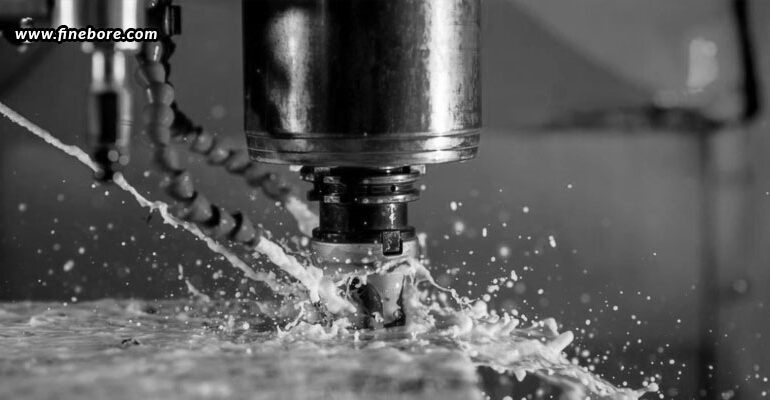Because they improve surface quality, dissipate heat, and reduce friction, cutting fluids are essential to machining operations. Choosing the appropriate cutting fluid extends tool life, increases productivity, and guarantees excellent machining outcomes. We’ll go over the various kinds of cutting fluids, their uses, and how to pick the ideal one for various machining operations in the blog below.
The role of cutting fluids in boring operations
Cutting fluids serve multiple purposes, such as:
- Lubrication: Reducing friction between the tool and workpiece so as to minimize wear.
- Cooling: Dissipating the heat produced during high-speed machining.
- Chip removal: Flushing away metal chips to prevent tool clogging.
- Corrosion prevention: Protecting both the tool and workpiece from rust and oxidation.
Types of cutting fluids
There are several types of cutting fluids, each appropriate for a particular machining task.
Straight oils
Straight oils are undiluted petroleum-based lubricants that provide excellent lubrication primarily in operations requiring heavy-duty machining like turning, drilling, deep-hole boring, reaming, tapping, and heavy-duty cutting operations in aerospace and automotive industries. They offer excellent lubrication, reduce friction and tool wear, and enhance surface finishes, but the two major disadvantages of using these types of fluids are that they have poor heat dissipation and may cause excessive smoke and mist.
Water-soluble fluids
Water-soluble fluids are oil-in-water emulsions that provide both cooling and lubrication, making them suitable for general machining operations like milling, grinding, and turning of ferrous metals, and also CNC machining that requires moderate cooling and lubrication. They offer superior cooling efficiency, cost-effectiveness, and reduced friction, but are prone to bacterial growth. Although they are easy to maintain and help in extending tool life, they are less effective when it comes to heavy-duty machining.
Synthetic fluids
Synthetic fluids are water-based cutting fluids with no petroleum oil, delivering excellent cooling for high-speed machining of aluminium, titanium, and composites. They are also ideal for grinding and other operations where heat control is crucial. These fluids ensure superior heat dissipation, minimal residue, and resistance to bacterial contamination. However, they also have limited lubrication properties and may cause skin irritation if not handled properly.
Semi-synthetic fluids
Semi-synthetic fluids are a combination of soluble oils and synthetics, offering balanced cooling and lubrication for general-purpose machining such as milling, drilling, and sawing of both ferrous and non-ferrous materials. They provide longer sump life, reduced mist formation, and better performance with an ideal cooling and lubrication balance. However, they equally require proper maintenance to prevent contamination, and are also more expensive than soluble oils.
Choosing the right cutting fluid for your machining operation
Material considerations
For aluminium and soft metals, water-soluble fluids or synthetic oils prevent staining and ensure a clean cut, while steel and stainless steel benefit from straight oils or semi-synthetic fluids for better lubrication. Titanium and hard alloys require high-performance synthetic fluids with extreme pressure (EP) additives to withstand tough machining conditions.
Matching fluids to machining processes
Boring and drilling demand lubricating fluids to reduce tool wear, whereas grinding requires synthetic fluids for effective cooling. Milling and turning benefit from semi-synthetic fluids, which provide a balance of cooling and lubrication for efficient machining.
Evaluating operational conditions
High-speed machining benefits from synthetic fluids due to their excellent heat dissipation, while heavy-duty cutting operations require straight oils or semi-synthetics to minimize tool wear. For multi-material machining, semi-synthetic fluids offer versatility and efficiency across different metals.
Environmental and safety considerations
Using eco-friendly, biodegradable fluids reduces environmental impact, and selecting fluids that do not pose health hazards ensures operator safety. Proper disposal methods should always be followed to maintain regulatory compliance and protect the environment.
When it comes to precision operations like boring, choosing the appropriate cutting fluid is essential to maximizing machining performance. The right fluid enhances tool life, reduces friction, and ensures superior surface finishes and workpiece quality. Boring tools suppliers in Bangalore, like FineTech Toolings, offer high-quality tools designed for maximum efficiency, which when used in conjunction with the right cutting fluid, can deliver exceptional precision and durability in machining applications.






